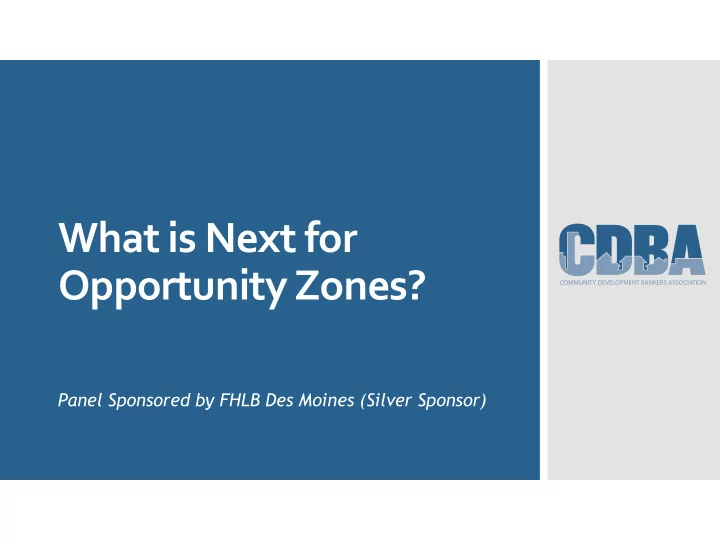

What is Next for Opportunity Zones? Panel Sponsored by FHLB Des Moines (Silver Sponsor)
CDBA Peer Forum Opportunity Zones Conversation Coordinated Opportunity Zone/Urban Redevelopment Plan for KC 1 . Align partnerships- City, Chamber, CDFIs, Community, Charitable donors 2. Create the desire to invest 3. Frame an Execution Plan
CDBA Peer Forum Opportunity Zones Conversation Accelerator For America The Kansas City Opportunity Zones Coalition Creation of the Prospectus Shows potential projects Minimal Fund Interest 31 plans already formed
CDBA Peer Forum Opportunity Zones Conversation Focus Area: Historic 18th & Vine Neighborhood
CDBA Peer Forum Opportunity Zones Conversation Midtown Urban Redevelopment Corp (MURC) Non Profit 501 c3 Community Board Advisory Board Creating a Redevelopment Plan Incentive Authority on behalf of the City Opportunity Zone Funds
Opportunity Zone Strategy • Build a local OZ network of potential investors, fund managers, developers, entrepreneurs, non-profits and government officials. • Ongoing distribution of updated information; periodic meetings to review and discuss updates. • Work with local legal and accounting firms to determine most effective ways of combining OZ equity with tax credit equity (NMTC, LIHTC, HTC) to increase total equity and reduce leverage. • Work with DMPED (Deputy Mayor for Planning and Economic Development) staff to provide network with information on DC programs that support eligible OZ projects (OZ Marketplace, OZ Community Corp, Neighborhood Prosperity Fund) to build interest. • Work with network participants to develop lending opportunities with projects in designated Opportunity Zones. Utilize other programs (SBA 504, DC Revenue Bonds, DC PACE, NMTC, LIHTC, HTC) for smaller projects that may not attract OZ equity.
While a potentially massively impactful community economic & revitalization tool, the Opportunity Zone program has obstacles Key Challenges • Lagging Opportunity Zone energy and knowledge in the communities themselves • Outside of large, urban-centric real estate pipeline, shovel-ready project demand is not prepared for Opportunity Zone capital inflow • Investors & business interests lack technical Opportunity Zone legal and tax expertise • Rural Opportunity Zone tracts and non-real estate businesses getting relatively minimal attention • Primary focus on financial returns rather than also community revitalization and wealth generation • Established connections between community business interests and investors largely do not exist in the Opportunity Zones • Unclear how to gather and combine additional Federal, State, and local incentives 7
Virginia is addressing these challenges with the creation of an Opportunity Zone Market The case for the Opportunity Zone Market: The Opportunity Zone program enables the goals outlined in the Comprehensive Economic Development Policy for the Commonwealth . As an equity-based program, stakeholders are rewarded for investing in and maximizing Virginia’s assets. The program is flexible enough to grow existing and new businesses across a range of industry. With proper oversight and facilitation, the program offers access to economic opportunity for citizens in traditionally underserved communities. Last, the program can be matched with Federal, Commonwealth, and local incentives to maximize the benefits for investors, communities and low-income individuals. Many States around the country have rallied around the Opportunity Zone initiative, but there is no prescribed leadership model for success. Like Virginia, many states have taken point by convening stakeholders, educating the community, and attracting investors. However, there is a unique opportunity for Virginia to be a beacon for the rest of the nation on two fronts: 1) building a market-place for stakeholders to learn & engage, to share project ideas & pipeline, and to link investors with business; and 2) making inclusive and equitable economic growth a priority alongside the market-driven capital flows. 8
The Virginia Opportunity Zone Market is founded on equitable and inclusive values Guiding Principles 1.Encourage and enable positive community impact investments in conjunction with financial returns 2.Ensure fair and equitable access to Opportunity Zone resources, support, and guidance for all localities and interests 3.Attract and match national capital and businesses with easily accessible and current information 4.Empower local business, government, and community leaders to take point in the Opportunity Zones 5.Leverage the full suite of Federal, Commonwealth, and local government programs & incentives in partnership with philanthropic and non-profit institutions 6.Operated by a neutral and independent third party to manage and facilitate the inclusive market-place with full transparency on process and participants 7.Seed the effort with one-time funding and become a self-sufficient operation over time 8.Track and measure socio-economic impact in Opportunity Zone communities 9
The Virginia Opportunity Zone Market will have three key features Capital Attraction Pipeline Development Clearinghouse Ongoing outreach and Tools and investment Inventorying of project pipeline proactive information sharing resources for local community, and investors with parameters to local government, business and economic to help matching community interests, development leaders to businesses and investors encourage and drive funding Online place for stakeholders to Opportunity Zone projects to learn, interact and engage Large national convening in with projects Virginia to build network of Identification of community investors focused on inclusive impact investments and Tracking and reporting on model, with Virginia seeking to steering to additional non- Opportunity Zone impact & share best practices of profit, philanthropic, and trends to inform additional inclusive opportunity zone technical assistance market-making activities marketplace resources Periodic convenings across Connections to Federal, state to generate energy, Commonwealth, local educate, and help build incentives and complimentary working relationships between programs stakeholders 10
What is Next for Opportunity Zones? Panel Sponsored by FHLB Des Moines (Silver Sponsor)
Recommend
More recommend